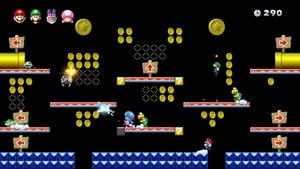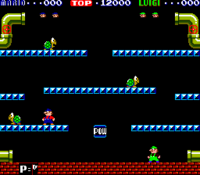Floor (Mario Bros.): Difference between revisions
No edit summary |
|||
| Line 34: | Line 34: | ||
==Names in other languages== | ==Names in other languages== | ||
{{foreign names | {{foreign names | ||
|Jap=フロア<ref>''Mario Bros.'' | |Jap=フロア<ref>''Mario Bros.'' {{file link|Mario Bros. Japanese flyer.jpg|Japanese flyer}}</ref> | ||
|JapR=Furoa | |JapR=Furoa | ||
|JapM=Floor | |JapM=Floor | ||
Revision as of 14:23, August 26, 2024
It has been requested that more images be uploaded for this article. Remove this notice only after the additional images have been added. Specific(s): Sprite/render of a floor
| Floor | |
|---|---|
 Several floors in New Super Mario Bros. U Deluxe | |
| First appearance | Mario Bros. (1983) |
| Latest appearance | Super Mario 3D World + Bowser's Fury (2021) |
In the Super Mario franchise, there is a type of floor or platform[1] that players can jump into from below to bend or dislodge it briefly in that spot, stunning or defeating any enemy located on top of that portion of the platform. This gameplay mechanic was introduced in Mario Bros. and has occurred commonly within the franchise, most notably through ? Blocks and Brick Blocks, which can act as described. This article notes more generic instances of this mechanic.
History
Mario Bros.
Floors appear as the main platforms used in Mario Bros. While they function as normal platforms when the player stands on them, the player can also bump them from below to stun enemies and collect coins on the place where the platform was bumped. Their appearance changes depending on the phase, and there are also slippery and invisible versions.
Floors reprise their roles in the various in-game ports of Mario Bros., including the battle mode in Super Mario Bros. 3, the Battle Game in Super Mario All-Stars, the remake in the Super Mario Advance games and Mario & Luigi: Superstar Saga, and the game Luigi Bros. in Super Mario 3D World and its Nintendo Switch port.
Super Mario series
New Super Mario Bros.
Floors reappear in New Super Mario Bros., behaving the same as in their debut game. They appear in World 2-2 and World 8-6.
New Super Mario Bros. U / New Super Luigi U / New Super Mario Bros. U Deluxe
Red and white platforms[2] return in New Super Mario Bros. U, New Super Luigi U, and their enhanced port. They are the same as before. Red and white platforms appear in Screwtop Tower, Shifting-Floor Cave, and World ![]() Coin-2 in New Super Mario Bros. U and in Sumo Bro's Spinning Tower in New Super Luigi U.
Coin-2 in New Super Mario Bros. U and in Sumo Bro's Spinning Tower in New Super Luigi U.
Super Smash Bros. series
Floors appear in the Super Smash Bros. series in the Mario Bros. stage introduced in Super Smash Bros. Brawl and returning in Super Smash Bros. Ultimate. They function the same as in the original arcade game. Bumping the platform while an opponent is on top bumps them into the air with no damage taken.
Gallery
Names in other languages
| Language | Name | Meaning | Notes |
|---|---|---|---|
| Japanese | フロア[3] Furoa |
Floor | |
| 床[4] Yuka |
|||
| マリオブラザーズ床[5] Mario Burazāzu Yuka |
Mario Brothers[6] Floor | ||
| Italian | Pavimento Mario Bros.[7] | Mario Bros. floor | |
| Piattaforma rossa e bianca[citation needed] (New Super Mario Bros. U Deluxe) | Red and white platform |
References
- ^ Rocha, Garitt, and Nick von Esmarch (November 11, 2016). Playing With Power: Nintendo NES Classics. Prima Games (American English). ISBN 9780744017779. Page 53–58.
- ^ Screwtop It Up video description in New Super Mario Bros. U Deluxe.
- ^ Mario Bros. Japanese flyer
- ^ 1983. Mario Bros. Famicom instruction booklet. Nintendo (Japanese). Page 7 and 8.
- ^ Sakai, Kazuya (Ambit) et al. (October 19, 2015). Super Mario Bros. Hyakka: Nintendo Kōshiki Guidebook, Super Mario Sunshine section. Shogakukan (Japanese). ISBN 978-4-09-106569-8. Page 119 and 217.
- ^ New Super Mario Bros. U internal filename (content/Common/actor/mario_brothers_yuka.szs)
- ^ November 15, 2018. Super Mario Bros. Enciclopedia. Magazzini Salani (Italian). ISBN 889367436X. Page 119 and 217.
| Mario Bros. | |
|---|---|
| Characters | Mario • Luigi |
| Items and objects | ? Blockb • ? Kinokoc • Cardb • Coin • Eggd • Fish Skeletond • Floor • Garbage cand • Heartd • Koopa Shelld • Ladderb • POW Block • Starmand • Super Mushroomc • Wafera |
| Enemies | Booc • Bowserd • Fighter Fly • Fireball • Icicle • Koopac • Shellcreeper • Sidestepper • Slipice • Spinybcd |
| Other | Gallery • Staff |



